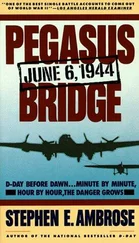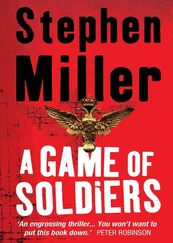Stephen Ambrose - Citizen Soldiers [Condensed]
Здесь есть возможность читать онлайн «Stephen Ambrose - Citizen Soldiers [Condensed]» весь текст электронной книги совершенно бесплатно (целиком полную версию без сокращений). В некоторых случаях можно слушать аудио, скачать через торрент в формате fb2 и присутствует краткое содержание. Жанр: История, на английском языке. Описание произведения, (предисловие) а так же отзывы посетителей доступны на портале библиотеки ЛибКат.
- Название:Citizen Soldiers [Condensed]
- Автор:
- Жанр:
- Год:неизвестен
- ISBN:нет данных
- Рейтинг книги:5 / 5. Голосов: 1
-
Избранное:Добавить в избранное
- Отзывы:
-
Ваша оценка:
- 100
- 1
- 2
- 3
- 4
- 5
Citizen Soldiers [Condensed]: краткое содержание, описание и аннотация
Предлагаем к чтению аннотацию, описание, краткое содержание или предисловие (зависит от того, что написал сам автор книги «Citizen Soldiers [Condensed]»). Если вы не нашли необходимую информацию о книге — напишите в комментариях, мы постараемся отыскать её.
Citizen Soldiers [Condensed] — читать онлайн бесплатно полную книгу (весь текст) целиком
Ниже представлен текст книги, разбитый по страницам. Система сохранения места последней прочитанной страницы, позволяет с удобством читать онлайн бесплатно книгу «Citizen Soldiers [Condensed]», без необходимости каждый раз заново искать на чём Вы остановились. Поставьте закладку, и сможете в любой момент перейти на страницу, на которой закончили чтение.
Интервал:
Закладка:
As Patton began his short right hook, swinging his divisions north, a glance at the map showed Hitler that the corridor through which Third Army received its supplies was exceedingly narrow (about 30 kilometres) and thus vulnerable. By bringing down more infantry and tankers from north of the Seine, Hitler told Kluge that he would have ample troops to cut that corridor. With these fresh troops Kluge could mount a full-scale counteroffensive. It would start at Mortain, objective Avranches. Once the line had been cut, Patton could be destroyed in place. The Germans could force the fighting back into the hedgerow country, perhaps even drive the Americans back into the sea.
Kluge and every soldier involved thought it madness. Beyond the problems of the Jabos and American artillery, these new divisions were not well equipped-few Panthers or Tigers-and anyway they were not fresh troops. Major Heinz-Giinter Guderian was with the 116th Panzer Division. He recalled, "Most of our people were old soldiers from the Eastern Front. Many of our wounded had returned. We also received parts of a training division, teenagers who had just been inducted and were not trained. To begin an attack with the idea that it is without hope is not a good idea. We did not have this hope." Hitler ordered it done.
Because Hitler mistrusted his generals, he took control of the battle, which forced him to use the radio, allowing Ultra-the British deciphering device-to reveal both the general plan and some of the details. So on August 5 Eisenhower knew what was coming: six German armoured divisions. Between them and Avranches stood one American infantry division-the 30th.
Despite the numbers, no one in the American high command doubted that the 30th, supported by Thunderbolts and British Typhoons and American artillery, could hold. Eisenhower told Patton to keep moving. In Elsenhower's view the Germans were sticking their heads in a noose. On the morning of August 7 he flew to Normandy and met with Bradley, who agreed to hold Mortain with minimal forces while rushing every available division south, through the corridor and out into the interior.
THE GERMAN attack had begun before dawn, tanks rolling forward through the night without artillery preparation. It had achieved tactical surprise and by noon was in Mortain. But the Germans could not dislodge the 700 men of the 2nd Battalion, 120th Infantry Regiment, 30th Division, from an isolated bluff. Hill 317, just east of the town. The GIs on the hill had a perfect view of the surrounding countryside, and forward observers with a radio system that allowed them to call in artillery and Jabos. The Germans had to take that hill before driving on to the coast.
Before dawn on the next day, August 8, one of the forward observers, Lieutenant Robert Weiss, heard, more than he saw, a concentration of German tanks milling around at a roadblock set up by the GIs the previous night. He had the coordinates already fixed and called in a barrage. "That kept them away," Weiss reported, "except for one tank which came through into our company territory, sniffing the dark like a nearsighted dragon. Our guys lay motionless, not a breath, not a sound. In the dark the tank found nobody to fight. It turned and went back to its lair."
With daylight German 88s began shelling the hill. At the top there was a rocky ridgeline. Weiss crawled up to it and lifted his head. He had a panoramic view, but there was the great danger that the Germans would spot him as he spotted them, especially as the sun was coming up and there was a reflection off his binoculars. He sucked in his breath, called his radio operator forward, and started crawling to the top of the crag. "We had to be quick," Weiss said. "The fire missions had to come with almost the speed of the shooting in a quick-draw western-and with comparable accuracy."
Sergeant Joe Sasser, tucked into the reverse slope, set up his radio:
"Ready, Lieutenant." Weiss called Sergeant John Corn to move up beside him before scrambling up the precipice to the top. The sun glared. Head low, body flattened, elbows stretched far apart and resting on the ground, binoculars up to his face, Weiss searched and waited.
The Germans began firing-88s and mortars. "Smoke from the muzzles of the German guns wreathed their position like smoke rings from a cigar," Weiss remembered. He called out to Sergeant Corn, "Fire Mission. Enemy battery," and gave the coordinates. Corn passed it on down to Sasser, who radioed in the coordinates.
Weiss could only wait in apprehension. Sasser called up softly, "On the way."
"A freight train roared by from the left side," Weiss said. "Almost instantly clouds of smoke broke near the German position. I shouted an adjusting command to Corn who passed it quickly to Sasser and on to battalion. The next salvos were right on target." That German battery was out of action.
Shells came in from the left from six enemy self-propelled guns. Weiss repeated the sequence with similar satisfactory results. Then a single tank and yet another battery fired on Hill 317. Weiss called in a barrage on the tank that set it ablaze, then turned his attention to the battery. The follow-up rounds were on target. "The enemy," Weiss noted with satisfaction, "had been neutralized."
Weiss called for some thirty fire missions that day, scrambling up the ridge each time the Germans began firing. Some half-dozen other observers were doing similar work that day.
EVEN AS THE Mortain offensive began, Patton's forces had overrun Le Mans and turned northwest, towards Argentan. Montgomery and Bradley agreed that the Americans should halt outside Argentan to await the Canadians (with the Polish 1st Armoured Division in the lead) coming down from Falaise. When they met, the entire German army in Normandy would be encircled.
The men of the 2nd Battalion of the 30th Division were on their own. By not reinforcing Hill 317, Bradley tempted the Germans to keep on pushing west. But how long could the men on the hill hold out? For five days the hill was surrounded. While the Americans and Canadians were closing the envelopment behind them, the Germans continued the offensive. They threw tank columns into the attack: American artillery, responding to Lieutenant Weiss and the other observers, broke them up.
On August 9, German light tanks tried again. There were five attacks in the first hour that morning. Weiss, who had not eaten or slept for 48 hours, was operating on adrenaline. He was 21 years old and filled with the wonderful feeling that he was making a difference in a crucial battle. The frantic activity-shooting up tanks, troops, guns, and vehicles-cut through his fatigue and masked it. He was exhilarated. On the third day, still without rest, he sent this message: "As sleepy, tired and hungry as I am, I never felt so good as I feel right now."
The observers were calling up to P-47s and British Typhoons whenever they saw German tanks on the road. Meanwhile, elements of the 4th, 9th, and 35th divisions hammered the German flanks. As on Hill 317, forward observers on high ground called in fire missions. Eighteen-year-old Private Robert Baldridge was in the 34th Field Artillery Battalion, 9th Division. He recalled, "The visibility from the top of this hill was excellent. What a change it was from the narrow confines of the hedgerows. We saw some twenty miles distant, even the spires of Mont-St. Michel."
That day the leading elements of the American forces got into Alengon. Argentan was but 40 kilometres to the northwest. But the GIs were meeting stouter resistance because the Germans were awakening to their danger. Major Charles Cawthorn, an infantry battalion CO in Patton's army, recalled that this was not "a game of Allied hounds coursing the German hare," as the press was reporting it, but rather the hunt after "a wounded tiger into the bush; the tiger turning now and again to slash at its tormentors, each slash drawing blood." Kluge, meanwhile, was pleading with Hitler to allow him to retreat to the east while the gap was still open.
Читать дальшеИнтервал:
Закладка:
Похожие книги на «Citizen Soldiers [Condensed]»
Представляем Вашему вниманию похожие книги на «Citizen Soldiers [Condensed]» списком для выбора. Мы отобрали схожую по названию и смыслу литературу в надежде предоставить читателям больше вариантов отыскать новые, интересные, ещё непрочитанные произведения.
Обсуждение, отзывы о книге «Citizen Soldiers [Condensed]» и просто собственные мнения читателей. Оставьте ваши комментарии, напишите, что Вы думаете о произведении, его смысле или главных героях. Укажите что конкретно понравилось, а что нет, и почему Вы так считаете.
![Stephen Ambrose Citizen Soldiers [Condensed] обложка книги](/books/346737/stephen-ambrose-citizen-soldiers-condensed-cover.webp)








